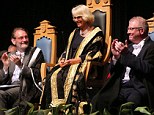Number of state school pupils accepted at Cambridge University increases by five per cent despite £9,000 a year tuition fees
- The number of ethnic minorities offered places increased by 16 per cent
- Private school entrants still account for 36.7 per cent of the intake
By Tara Brady
|
The number of state school students being accepted to Cambridge University has increased by five per cent.
Cambridge announced the proportion of state-educated students has risen to 63.3 per cent despite applicants facing the maximum tuition fees of £9,000-a-year.
The university also announced the proportion of successful applicants from ethnic minorities has also increased to 16 per cent.

Cambridge announced the proportion of state-educated students has risen despite applicants facing the maximum tuition fees of £9,000-a-year
However, private school entrants still account for 36.7 per cent of the university’s undergraduate intake.
The ratio of two state school pupils to every public school pupil attending the university is still disproportionate compared with the number of secondary school pupils in the country as a whole.
Across Britain 88.9 per cent of university starters are from state-funded schools, according to the Higher Education Statistics Agency (HESA).
The statistics showing a public school leaning does still remain in place at Cambridge.
The university yesterday said its rising state school intake was achieved despite 97.4 per cent of successful applicants achieving no less than A*AA.
The rise comes after university invested £2.7m on outreach initiatives across the UK designed to identify and engage with students from under-represented groups.
Dr Mike Sewell, director of admissions for the Cambridge Colleges, said: 'The collegiate University works hard to reach talented and ambitious students throughout the UK, talk with them about why they should consider Cambridge, and tackle the barriers that might put them off applying.

Private school entrants at Cambridge University still account for 36.7 per cent of undergraduate intake
'Our undergraduates enjoy teaching focused on the individual student, outstanding facilities, a relatively low cost of living, and a generous bursary scheme available to all who need it.
'Our commitment to fair admissions makes this available to students from all backgrounds, who succeed in their application because they have demonstrated academic excellence.
'AS results enable fair and transparent admissions by allowing universities such as Cambridge to make assessments based on a student’s most recent academic attainment.'
The total number of applications is up two per cent to 15,701 with the total number of acceptances up five per cent to 3,437.
But the male population of students still outweigh female applicants by eight per cent.
These statistics refer to applicants making an application in October 2011, either for entry in October 2012 or deferred entry in October 2013.
-
 'Crazy ants' that feast on electronics and are invading the...
'Crazy ants' that feast on electronics and are invading the...
-
 Revealed: The acrobat girlfriend of NSA whistle blower...
Revealed: The acrobat girlfriend of NSA whistle blower...
-
 'I listened to Marilyn die': Private eye who bugged Monroe's...
'I listened to Marilyn die': Private eye who bugged Monroe's...
-
 Pictured: George Zimmerman's defense release 'tape of...
Pictured: George Zimmerman's defense release 'tape of...
-
 Husband accused of being a 'cheater' by more than 183,000...
Husband accused of being a 'cheater' by more than 183,000...
-
 One-armed woman who says she 'loves giving people permission...
One-armed woman who says she 'loves giving people permission...
-
 Former NFL player Chad 'Ochocinco' Johnson sentenced a MONTH...
Former NFL player Chad 'Ochocinco' Johnson sentenced a MONTH...
-
 The palace on wheels! World’s most expensive motorhome...
The palace on wheels! World’s most expensive motorhome...
-
 The chilling pictures of suitcases left in a New York insane...
The chilling pictures of suitcases left in a New York insane...
-
 From the gaping jaws of a giant shark to the intricate dance...
From the gaping jaws of a giant shark to the intricate dance...
-
 Was it a bird? A Plane? Or a UFO?? Chinese passenger jet...
Was it a bird? A Plane? Or a UFO?? Chinese passenger jet...
-
 Is this proof the Virgin Queen was an imposter in drag?...
Is this proof the Virgin Queen was an imposter in drag?...















































































































































































Apart from all the obvious wealth, better schooling and environmental disadvantages, bright state school pupils are further disadvantaged because their schools are not as well practised at the process of applying to Oxbridge as private schools and perhaps don't coach them in interview technique and aptitude testing. Applicants should also consider less competitive courses. Looking at the figures provided by Cambridge it seems young people have a better chance of gaining a place there than they do of getting a job, so it's definitely worth applying. Government grants and college bursaries for poor students are generous but unfair. E.g. A student from a poor family may have half her fees paid and refuse the maintenance loan due to getting the government grant. At the end of her three year degree she will owe £13,500 compared to a student from a normal income family who will owe around £40,000. Yet the poor student may go on to earn more money than the regular student.
- Sonia , UK, United Kingdom, 24/5/2013 00:49
Report abuse